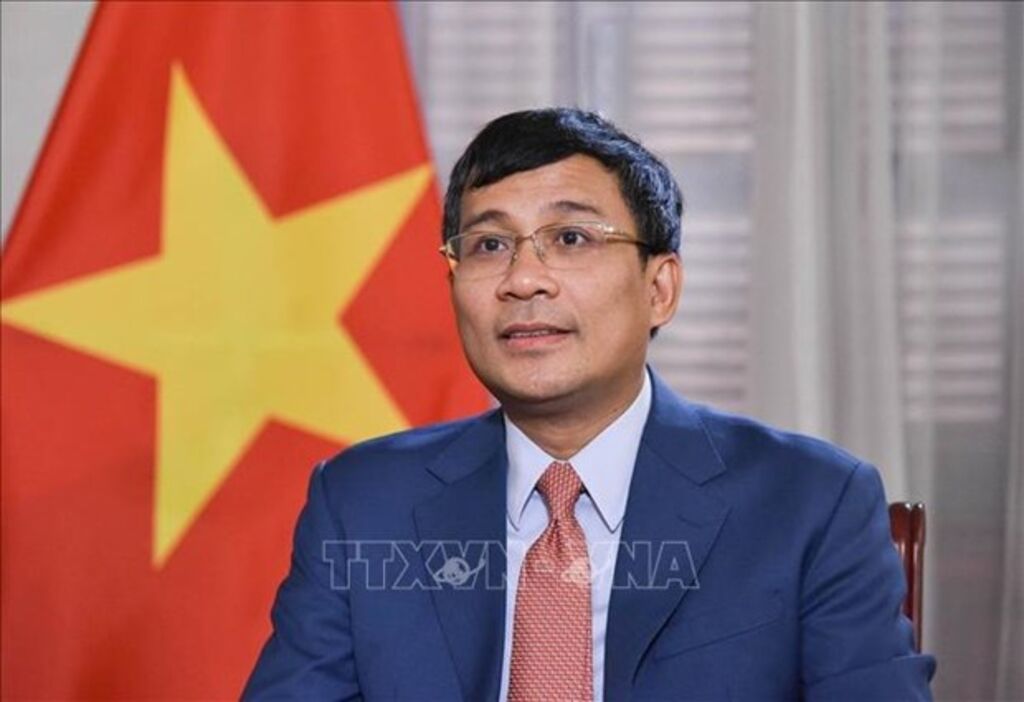 |
| Permanent Deputy Minister of Foreign Affairs Nguyen Minh Vu.__Photo: VNA |
Permanent Deputy Minister of Foreign Affairs Nguyen Minh Vu and Chinese Assistant Minister of Foreign Affairs Nong Rong have shared their view on measures to materialize high-level common perceptions between the two countries.
During their talks in Ho Chi Minh City on February 4, the officials focused on how to concretize the joint statement on continuing to deepen and elevate the comprehensive strategic cooperative partnership between the two countries, and to build a Vietnam-China community with a shared future that carries strategic significance.
They noted with pleasure the positive development pace of the bilateral relationship, and its milestones over the past time, especially the visit to China by Party General Secretary Nguyen Phu Trong in October 2022, and the state visit to Vietnam by Party General Secretary and President of China Xi Jinping in December 2023.
The officials agreed to step up high-level exchanges, contacts and visits, effectively implement cooperation mechanisms between the two Parties, and well organize the 16th meeting of the Vietnam-China Steering Committee for Bilateral Cooperation.
The two sides will also enhance collaboration in national defense, security, external affairs, culture, education and tourism, and people-to-people exchange, while expanding cooperation in economy and trade, and transport connectivity, for the sake of their peoples and businesses.
They will work together to better manage the common border line, and satisfactorily address border issues lingering or emerging, in line with their reached documents and agreements.
Vu, who is also Secretary General of the Steering Committee for Vietnam – China Bilateral Cooperation, suggested the two sides foster their transport connectivity, especially roads and railways connecting Vietnam’s northern provinces and China’s southern and southwestern regions.
He called on China to expand its import of Vietnamese agro-aquatic products and facilitate the establishment of Vietnamese trade promotion offices in Haikou, Chengdu, and Nanjing.
The two sides should work to soon negotiate and sign a framework agreement on rice trade, he said, suggesting China support Vietnamese businesses that have received the national brand title to build distribution channels and develop brands in the neighboring market.
Vu also suggested the two sides expand collaboration in investment and direct relevant agencies and enterprises to remove prolonged obstacles to a number of industrial projects, speed up the implementation of those in Vietnam using China’s non-refundable aid, and form a working group to promote tourism cooperation.
The two countries should strengthen water resources cooperation, effectively and sustainably using Mekong River water resources, for the legitimate interests of all parties, especially downstream countries, he continued.
Sharing Vu’s views, Nong Rong, who is also Secretary General of the Steering Committee for China-Vietnam Bilateral Cooperation, affirmed that China is ready to expand the import of high-quality agricultural products from Vietnam, and accelerate the licensing process for the official import of Vietnamese fresh coconut, citrus fruits, and avocado.
He proposed the two sides push ahead with the building of the smart border gate model to improve customs clearance efficiency and ease goods congestion at border gates, expand cooperation in green development, digital economy, and new energy development, further their coordination and cooperation at regional and international multilateral forums.
The officials exchanged views on maritime issues candidly and sincerely, emphasizing the importance of maintaining peace and stability at sea amidst the complex development of the international and regional situation.
The two sides consented to effectively implement high-level common perceptions and the Vietnam-China agreement on basic principles guiding the settlement of sea-related issues, carry forward negotiation mechanisms, and make efforts to control and better resolve differences at sea based on the sequential and gradual principle, easy first and hard later.
They will work together with ASEAN countries to fully and effectively implement the Declaration on the Conduct of Parties in the East Sea (DOC), striving to soon achieve an effective and substantive Code of Conduct in the East Sea (COC) in accordance with international law, especially the 1982 United Nations Convention on the Law of the Sea (1982 UNCLOS).
Vu proposed the two sides respect each other's sovereignty, sovereign rights, and jurisdiction established in line with international law and the 1982 UNCLOS, prevent complex incidents affecting the bilateral relationship, and properly handle issues regarding fishing vessels and fishermen, contributing to peace and stability in the region.-(VNA/VLLF)









